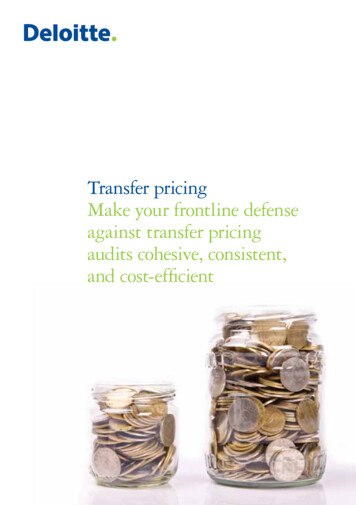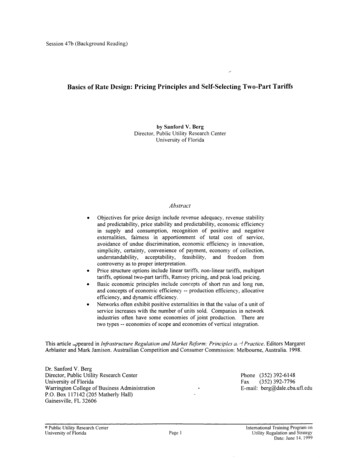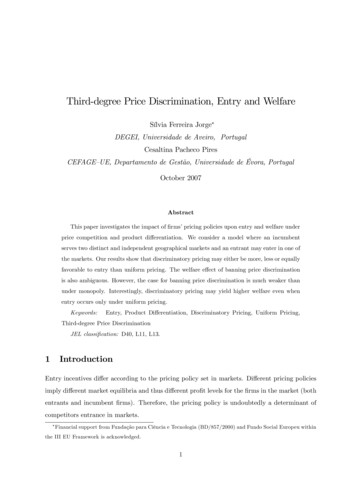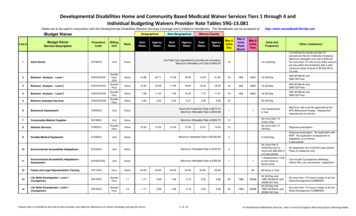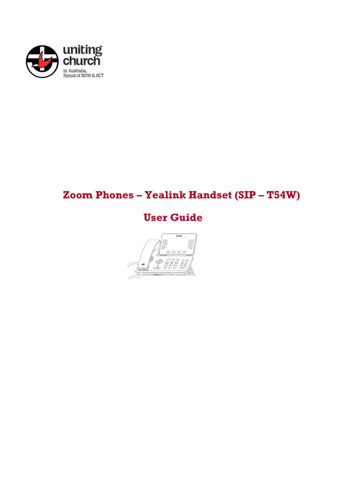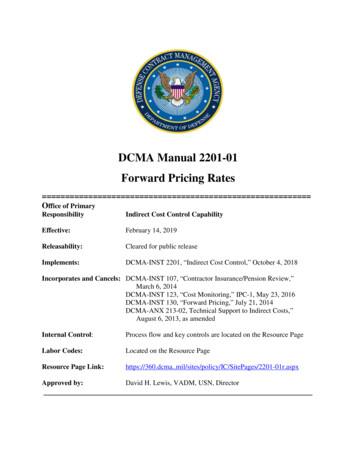
Transcription
DCMA Manual 2201-01Forward Pricing Rates Office of PrimaryResponsibilityIndirect Cost Control CapabilityEffective:February 14, 2019Releasability:Cleared for public releaseImplements:DCMA-INST 2201, “Indirect Cost Control,” October 4, 2018Incorporates and Cancels: DCMA-INST 107, “Contractor Insurance/Pension Review,”March 6, 2014DCMA-INST 123, “Cost Monitoring,” IPC-1, May 23, 2016DCMA-INST 130, “Forward Pricing,” July 21, 2014DCMA-ANX 213-02, Technical Support to Indirect Costs,”August 6, 2013, as amendedInternal Control:Process flow and key controls are located on the Resource PageLabor Codes:Located on the Resource PageResource Page s/2201-01r.aspxApproved by:David H. Lewis, VADM, USN, Director
DCMA-MAN 2201-01, February 14, 2019Purpose: This issuance, in accordance with the authority in DoD Directive 5105.64: Implements policy established in DCMA Instruction 2201, “Indirect Cost Control.”Provides and defines procedures and responsibilities for developing and monitoringforward pricing rate agreements and forward pricing rate recommendations.Establish procedures and assign responsibilities for establishing a cost monitoring plan.Establish procedures and assign responsibilities for performing technical support toindirect costs activities.Establish procedures and assign responsibilities for performing contractorinsurance/pension review for DCMA.2
DCMA-MAN 2201-01, February 14, 2019TABLE OF CONTENTSSECTION 1: GENERAL ISSUANCE INFORMATION .51.1. Applicability.51.2. Policy .5SECTION 2: RESPONSIBILITIES .62.1. Executive Director, Contracts .62.2. Contract Management Office Commander/Director, DCMA Special Programs Directorof Cost/Pricing Division, Cost and Pricing Center Corporate AdministrativeContracting Officer/Divisional Administrative Contracting Officer Group Director .62.3. Contract Management Office Contracts Director, Cost and Pricing Center CorporateAdministrative Contracting Officer/Divisional Administrative Contracting OfficerGroup Supervisor, DCMA Special Programs Divisional Administrative ContractingOfficer Supervisor .62.4. Director, Technical Directorate, Engineering Division .72.5. Hub Directors, Cost and Pricing Center .72.6. Engineering and Manufacturing Group Chief, Integrated Cost Analysis Team Director .82.7. Technical Support to Indirect Costs Coordinator .82.8. Technical Supervisor or Technical Lead .82.9. Contractor Insurance/Pension Review Team Supervisor .8SECTION 3: FORWARD PRICING RATES .93.1. Determine Whether a Forward Pricing Rate Recommendation or Agreement and CostMonitoring Program is Required .93.2. Obtain Contractor’s Proposal and Review for Adequacy .103.3. Conduct Proposal Analysis .113.4. Document and Review Prenegotiation Objectives .133.5. Establish a Forward Pricing Rate Recommendation or Negotiate Rates .153.6. Document and Review Price Negotiation Memorandum and Issue Rate Agreement .163.7. Distribute Rate Agreement, Rate Recommendation and Negotiation Memorandum .173.8. Monitor Rates .18SECTION 4: COST MONITORING .204.1. Determine Whether Cost Monitoring Program is Required .204.2. Prepare Cost Monitoring Plan .214.3. Conduct Cost Monitoring Activities.264.4. Prepare Cost Monitoring Report .27SECTION 5: TECHNICAL SUPPORT TO INDIRECT COSTS .305.1. Technical Support to Indirect Costs Requests .305.2. Receive and Coordinate Technical Support to Indirect Costs Request .305.3. Review Technical Support to Indirect Costs Request .315.4. Perform Technical Support to Indirect Costs Analysis .315.5. Prepare Technical Support to Indirect Costs Report .345.6. Provide Negotiation Support .365.7. Complete Technical Support to Indirect Costs Support .36SECTION 6: CONTRACTOR INSURANCE/PENSION REVIEW .376.1. Determine the Need for a Contractor Insurance/Pension Review .37Table of Contents3
DCMA-MAN 2201-01, February 14, 20196.2. Request and Plan a Contractor Insurance/Pension Review .386.3. Disposition Contractor Insurance/Pension Review Findings .39SECTION 7: RETENTION OF RECORDS .407.1. Requirement to Establish Files .407.2. Storage, Handling, and Disposal .407.3. Records Management System .407.4. Protecting Classified and Controlled Unclassified Information .41GLOSSARYG.1. Definitions .42G.2. Acronyms .44REFERENCES .46Table of Contents4
DCMA-MAN 2201-01, February 14, 2019SECTION 1: GENERAL ISSUANCE INFORMATION1.1. APPLICABILITY. This Manual applies to all DCMA personnel.1.2. POLICY. It is DCMA policy to support Procuring Activities in negotiating a fair andreasonable prices through Forward Pricing Rate Recommendations and Forward Pricing RateAgreements.a. Forward Pricing Rates. A Forward Pricing Rate Proposal (FPRP) is submitted bycontractors to the government for their rates over a period of time used in their proposals. TheGovernment has responsibility to perform reviews of contractor rate proposals to establish theGovernment negotiation position and to negotiate the Forward Pricing Rates (FPR) to ensure thatcontract prices are fair and reasonable.b. Cost Monitoring (CM).(1) Effective management of contract costs is essential to the efficient and economicalperformance of Government contracts. Contractors are responsible for managing and controllingtheir direct and indirect costs; however, DCMA must systematically monitor the management ofcontractors’ costs to ensure these responsibilities are met in accordance with Defense FederalAcquisition Regulation Supplement/Procedures, Guidance and Information DFARS PGI242.302(a)(S-75)(b).(2) DCMA must establish Cost Monitoring Program (CMP) for all contractors whosesales to the Government, during the contractor’s next Contractor Fiscal Year (CFY), areexpected to exceed 200 million based on costs incurred or negotiated based on projected costsas outlined at DFARS PGI 242.302(a)(S-75)(c)(1)(i)(A). The exceptions are stated in Section 4of this Manual.c. Technical Support to Indirect Costs (TSI). Provide quality and timely technicalassessments to support forward pricing rate and CM efforts. The assessments includerecommendations to help determine and obtain fair and reasonable FPR and provide insight inmonitoring contractor’s costs. TSI represents on-demand activities which are performed onrequired or needed basis.d. Contractor Insurance/Pension Review (CIPR). In accordance with DFARS 242.7301, asthe DoD Executive Agency for the performance of all CIPRs, determine the allowability ofinsurance and pension costs in Government contracts and for the need for a CIPR.Administrative Contracting Officers (ACOs) and Cost Monitors must follow the requirements ofDFARS 242.73, “Contractor Insurance/Pension Review” and DFARS PGI 242.73. “ContractorInsurance/Pension Review,” when requesting a CIPR.e. Safety. Execute this Manual in a safe, efficient, effective, and ethical manner.Section 1: General Issuance Information5
DCMA-MAN 2201-01, February 14, 2019SECTION 2: RESPONSIBILITIES2.1. EXECUTIVE DIRECTOR, CONTRACTS. The Executive Director, Contracts, will:a. Designate a management official to oversee the DCMA FPRs system.b. Assure management officials throughout the agency understand the value of the auditprocess and are responsive to audit findings and recommendations.c. Require periodic internal reviews of the Agency FPR procedures and performance todetermine whether ACOs resolve and disposition audit findings and recommendations.2.2. CONTRACT MANAGEMENT OFFICE COMMANDER/DIRECTOR, DCMASPECIAL PROGRAMS DIRECTOR OF COST/PRICING DIVISION, COST ANDPRICING CENTER CORPORATE ADMINISTRATIVE CONTRACTINGOFFICER/DIVISIONAL ADMINISTRTIVE CONTRACTING OFFICER GROUPDIRECTOR. Contract Management Office (CMO) Commander/Director, DCMA SpecialPrograms (DCMAS) Director of Cost/Pricing Division, Cost and Pricing Center CorporateAdministrative Contracting Officer (CACO)/Divisional Administrative ContractingOfficer(DACO) Group Director will:a. Concur or Non-concur the request to establish a CMP for a contractor that does not meetthe criteria of a CMP, but a business need (e.g., significant cost/pricing activity) justifies theestablishment of a CMP.b. Concur or Non-concur a CMP waiver request for a contractor that meets the criteria for aCMP but an alternate course of action is justified (e.g., where the rates for a business unit arenegotiated at another site). Provide resources to support a CMP with a CM team as specified inSection 4.2. of this Manual.c. Review and concur/non-concur the annual CM report.d. Establish delegation authority for approval of quarterly CM reports. This delegation doesnot apply to approval of the annual CM report.e. The Director of DCMAS Cost/Pricing Division or the Director of Cost and Pricing CenterCACO/DACO Group will ensure compliance with Section 6 of this Manual.2.3. CONTRACT MANAGEMENT OFFICE CONTRACTS DIRECTOR, COST ANDPRICING CENTER CORPORATE ADMINISTRATIVE CONTRACTINGOFFICER/DIVISIONAL ADMINISTRTIVE CONTRACTING OFFICER GROUPSUPERVISOR, DCMA SPECIAL PROGRASMS DIVISIONAL ADMINISTRTIVECONTRACTING OFFICER SUPERVISOR. The CMO Contracts Director, Cost and PricingCenter CACO/DACO group supervisor, and DCMAS DACO supervisor will:Section 2: Responsibilities6
DCMA-MAN 2201-01, February 14, 2019a. Review and provide written concurrence or nonconcurrence to the ACO’s writtendetermination related to the establishment/nonestablishment of an Forward Pricing RateRecommendation (FPRR)/Forward Pricing Rate Agreement (FPRA) and/or CMP in accordancewith paragraph 3.1.a. of this Manual.b. Review and provide written concurrence or nonconcurrence by signing decisionalmemorandums.c. Ensure that Boards of Review (BoRs) are properly requested when required.d. Establish a file location to contain the records of all FPRR/FPRA actions in accordancewith Federal Acquisition Regulation (FAR) 4.801(a).e. Ensure the data in the FPRA eTool and the Contract Business Analysis Repository(CBAR) eTool is current and accurate and any changes are entered immediately.f. In coordination with the CMO Commander/Director, DCMAS Director of Cost/PricingDivision, or CACO/DACO Group Director, provide resources to support a CM team as specifiedin Section 4.2. of this Manual.g. Review and concur/non-concur the annual CM plan.h. Review and concur/non-concur the quarterly/annual CM report.i. Ensure Defense Contract Audit Agency (DCAA) audit reports and Host Nation auditreports provided in support of a CIPR report are properly resolved and dispositioned.j. Ensure the ACO provides disposition memorandums to DCAA and all contributingfunctional specialists upon completion.2.4. DIRECTOR, TECHNICAL DIRECTORATE, ENGINEERING DIVISION. TheDirector, Technical Directorate, Engineering Division will:a. Serve as the agency central point of contact (POC) and advocate for all Technical PricingSupport policy, training, and tools.b. Provide base resources in developing and monitoring policy implementation, identifyingand developing training requirements.c. Identify and develop the tools necessary to conduct the DCMA Technical Pricing Supportfunction.2.5. DIRECTOR, REGIONAL HUB OF COST AND PRICING CENTER . Assist theDirector of Proposal Pricing in gathering the technical resources necessary to providecontingency support.Section 2: Responsibilities7
DCMA-MAN 2201-01, February 14, 20192.6. ENGINEERING AND MANUFACTURING GROUP CHIEF (EMGC),INTEGRATED COST ANALYSIS TEAM (ICAT) DIRECTOR. The EMGC and ICATDirector will:a. Manage resources (e.g., technical personnel and workload) to meet Technical Supportto Indirect Costs (TSI) taskings.b. Maintain visibility of TSI requests and trends.c. Designate a TSI Coordinator.2.7. TECHNICAL SUPPORT TO INDIRECT COSTS COORDINATOR. The TSICoordinator is the focal point for receiving and managing TSI requests.2.8. TECHNICAL SUPERVISOR OR TECHNICAL LEAD. The Technical Supervisor orTechnical Lead will:a. Manage the workload of the assigned individuals.b. Assign technical specialists to TSI efforts.c. Review and approve technical reports and supporting documentation prior to release torequestor.d. Ensure completion of technical case file.2.9. CIPR TEAM SUPERVISOR. The Supervisor of the CIPR Team will:a. Establish a schedule to support the FPRR/FPRA and CM.b. Direct any requests for review of insurance and/or defined benefit pension and/or otherfunded executive or post retirement employee benefit costs of business entities from DoDcustomers.c. Review and approve reports prior to issuance of report by the CIPR Team to an ACO orexternal customer.Section 2: Responsibilities8
DCMA-MAN 2201-01, February 14, 2019SECTION 3: FORWARD PRICING RATES3.1. DETERMINE WHETHER A FORWARD PRICING RATE RECOMMENDATIONOR AGREEMENT AND COST MONITORING PROGRAM IS REQUIRED.a. The ACO must determine whether an FPRR or FPRA and CMP must be established basedon an assessment of contractor sales volume.(1) The ACO must establish an FPRA or FPRR and CMP (see Section 4 of this Manual)for all contractors whose sales to the Government, during the contractor’s next CFY, areexpected to exceed 200 million.(a) Sales to the Government during the next CFY are determined by the ACO inaccordance with DFARS PGI 242.302(a)(s-75)(c)(1)(i)(A). An exception exists where the ACOmakes a written determination that the contractor will not have a significant volume ofnegotiated Government contract proposals in future periods.(b) A CMO Contracts Director, a CACO/DACO Group supervisor, or a DCMASDACO supervisor must provide written concurrence or nonconcurrence to the ACO’s writtendetermination not to establish an FPRR/FPRA and CMP for a contractor with more than 200million expected Government sales in the next CFY.(2) The ACO may establish an FPRR or FPRA and CMP (see Section 4 of this Manual)even if the contractor does not meet the criteria for a mandatory FPRR or FPRA and CMP whenthere is a significant volume of negotiations, customer demand, or a contractor request.(a) In determining whether to establish an FPRR or FPRA and CMP, the ACOshould consider whether the benefits to be derived from an FPRR or FPRA are commensuratewith the effort to establish and track an FPRR or FPRA in accordance with FAR 42.1701(a).(b) A CMO Contracts Director, a CACO/DACO Group supervisor, or a DCMASDACO supervisor must serve as approval authority over any ACO written determination toestablish an FPRR/FPRA and CMP for a contractor with less than 200 million expectedGovernment sales in the next CFY.(3) When an FPRR or FPRA is not available or establishment of an FPRR or FPRA isnot required, the ACO will provide customers with the best information available such as thecontractor’s business system status at the time to assist the customers in developing a rateposition for negotiation.b. If the ACO makes a determination that an FPRR/FPRA and CMP (see Section 4 of thisManual) is required or permitted, then the FPRR/A record must be created in the FPRA eToolapplication. A determination that meets the criteria of paragraphs 3.1.a.(1) or 3.1.a.(2) of thissection to require approval from a CMO Contracts Director, a CACO/DACO Group supervisor,or a DCMAS DACO supervisor must be documented in a memorandum and stored, inSection 3: Forward Pricing Rates9
DCMA-MAN 2201-01, February 14, 2019accordance with DCMA-INST 809, “Records Management,” in the Agency-approved filingsystem.3.2. OBTAIN CONTRACTOR’S PROPOSAL AND REVIEW FOR ADEQUACY.a. The ACO will obtain the contractor’s FPRP and require that the cost or pricing data in theproposal meet FAR 42.1701(b) requirements for accuracy, completeness and currency.However, the ACO will not require certification at the time of agreement for data supplied insupport of an FPRA or other advance agreements. When an FPRA or other advance agreementis used to price a contract action that requires a certificate, the certificate supporting that contractaction must cover the data supplied to support the FPRA or other advance agreements and allother data supporting the action in accordance with FAR 15.407-3(c).b. The ACO must determine whether data supporting the FPRP is submitted in a formacceptable to the ACO in accordance with FAR 15.403-5(b)(3). The ACO must use the“Contractor Forward Pricing Rate Proposal Adequacy Checklist” linked in the resource page todetermine whether the contractor’s FPRP is adequate for the Government to conduct anevaluation. To ensure the proposal is complete, the ACO must request that the contractorcomplete the Contractor Forward Pricing Rate Proposal Adequacy Checklist and submit it withthe forward pricing rate proposal in accordance with DFARS 215.403-5. The checklist will beretained as part of the official file. The proposal must contain:(1) An explanation of how the rates were derived for each of the out-years so thatreasonableness can be determined. For example, flat-lining of the out-year rates with noexplanation of why the rates do not change is not adequate. Adjustments to out-year pools andbases should be made based on reasonable sales forecasts and the contractor’s assumptions forchanges to major groupings of costs (e.g., variable, semi-variable, and fixed).(2) An appropriate level of documentation with supporting data provided by thecontractor. This determination calls for an exercise of judgment by the ACO. The ACO mustconsider the specific contractor and pending contract awards in determining whether thecontractor has provided documentation that adequately supports the contractor’s FPRP. Forinstance, a contractor may not develop detailed budgetary data because it is impractical for theirorganization. Also, it is common for a contractor to assert that historical costs are the mostappropriate basis to estimate out-year rates. In these cases, the contractor should provide thenecessary trend data with appropriate explanations to support a conclusion that historical costsare the most reasonable for forecasting out-year rates. The out-year projections must besupported by the contactor based on Long Range Plans/Strategic Plans.c. If the ACO determines that the contractor’s proposal is inadequate based on the reviewstated in paragraph 3.2.b., the ACO must return the proposal to the contractor and request thecontractor submit an adequate proposal. The request must identify the nature of the inadequacyso that the contractor will have sufficient information to be able to respond appropriately to therequest. The ACO should consider whether the inadequacy in the submitted FPRP indicates adeficiency in the contractor’s estimating system. Where applicable, the ACO must document theSection 3: Forward Pricing Rates10
DCMA-MAN 2201-01, February 14, 2019actions taken to obtain adequate cost or pricing data in accordance with FAR 15.404-2(d) andFAR 15-404-1(c)(2)(v).3.3. CONDUCT PROPOSAL ANALYSIS.a. The objective of the analysis is to ensure that the FPRR/FPRA is fair and reasonable inaccordance with FAR 15.404-1(a).b. The ACO must use cost analysis to evaluate the reasonableness of individual costelements when cost or pricing data are required in accordance with FAR 15.404-1(a)(3) and (4).Cost analysis is the review and evaluation of any of the separate cost elements in a contractor’sproposal to determine a fair and reasonable price or to determine cost realism, and theapplication of judgment to determine how well the proposed rates represent what the rates of thecontract should be, assuming reasonable economy and efficiency in accordance with FAR15.404-1(c)(1). The method of cost analysis that can be used by the ACO is included in the“Cost Monitoring Handbook.” The handbook is linked in the resource page.c. The ACO may use various cost analysis techniques and procedures to ensure fair andreasonable rates in accordance with FAR 15.404-1(c)(2). Such techniques and proceduresinclude (but are not limited to) the determination of the following areas:(1) The contractor’s basis of estimates are reasonable.(2) The supporting cost or pricing data are current, accurate, and complete as of the dateof submission in accordance with FAR 42.1701(b).(3) The contractor’s estimating practices comply with the contractor’s disclosed orestablished cost accounting practices.(4) Projected business volume, allocation bases, and indirect costs are reasonable andconsistent with contractor and customer business projections.(5) Rate computations are mathematically correct.(6) The proposal is in compliance with the cost principles and procedures in FAR 31.2and DFARS 231.2 in accordance with FAR 31.103(a).(7) The contractor’s FPRP is in compliance with, when applicable, the requirements andprocedures in 48 CFR Chapter 99, Cost Accounting Standards in accordance with FAR 15.4041(c)(2)(iv).(8) Reasonableness of cost or pricing data and the evaluation of cost elements inaccordance with FAR 15.404-1(c)(2)(i):(a) The necessity for, and reasonableness of, proposed costs, including allowancesfor contingencies.Section 3: Forward Pricing Rates11
DCMA-MAN 2201-01, February 14, 2019(b) Projection of the contractor’s cost trends, on the basis of current and historicalcost data.(c) Reasonableness of estimates generated by appropriately calibrated and validatedparametric models or cost-estimating relationships.(d) The application of audited or negotiated indirect cost rates, labor rates, and costof money or other factors.(9) The evaluation of the effect of the contractor’s current practices on future costs. Inconducting this evaluation, the ACO will ensure that the effects of inefficient or uneconomicalpast practices are not projected into the future in accordance with FAR 15.404-1(c)(2)(ii).(10) The comparison of costs proposed by the contractor for individual cost elementswith the following data is in accordance with FAR 15.404-1(c)(2)(iii):(a) Actual costs previously incurred by the same contractor.(b) Previous cost estimates from the contractor or from other offerors for the same orsimilar items.(c) Other cost estimates received in response to the Government’s request.(d) Independent Government cost estimates by technical personnel.(e) Forecasts of planned expenditures.(11) The review of cost elements from the “should-cost” point of view, if applicable, toevaluate significant indirect cost elements in-depth, and identify and recommend correctiveactions regarding inefficient and uneconomical practices in accordance with FAR 15.407-4(c).d. The ACO will determine the need for audit and/or technical support (see Sections 4, 5,and 6 of this Manual).(1) DCAA Audit:(a) Request. The ACO, or the Cost Monitoring Specialist (CMS) delegated by theACO, will requests a DCAA audit when the contractor submits a rate proposal or updated rateposition and the ACO or the CMS determines that the support from DCAA is necessary fornegotiation. The ACO must tailor the audit requests to reflect the minimum essentialsupplementary information needed to conduct a technical, cost or pricing analysis in accordancewith FAR 15.404-2(a)(1). If the ACO and/or the CMS determine that a DCAA audit is notnecessary because they have the capability to conduct a thorough review, they should justify thedecision in the Prenegotiation Objectives Memorandum (PNOM). While awaiting the results ofthe audit and if a delay in issuing the audit report is anticipated, the ACO and/or the CMS mustSection 3: Forward Pricing Rates12
DCMA-MAN 2201-01, February 14, 2019continue to analyze and develop a negotiation objective and proceed to establish an FPRR as aminimum.(b) Receipt of a DCAA Audit.1. Upon receipt of a DCAA audit report, the ACO must review the audit findings,determine whether the current FPRR or FPRA requires revision, issue a revised FPRR within 5business days, and continue to work toward negotiating a FPRA if appropriate. In this case, theACO can issue the FPRR with a memorandum for record (MFR) and the historical rate data,rather than with a PNOM. The DCAA position on FPRP must be reflected in developing theACO’s FPRR position. The ACO must address DCAA unsupported costs and unresolved costsin either the PNOM or Price Negotiation Memorandum (PNM).2. If the ACO deviates from the DCAA audit position, the ACO will discussthese issues with the DCAA auditor to obtain a joint resolution. If a joint resolution cannot bereached on significant issues and DCAA’s management requests DCMA management review ofthe ACO’s position, DCMA review will be accomplished in accordance with BoR GeneralPractice found on the main resource page of DCMA Instruction (DCMA-INST) 2201 prior to theissuance of the FPRR or FPRA. The ACO’s PNOM must document all discussions with DCAA,mutual resolutions, and/or differences of opinion. If major issues are escalated to DCMAmanagement to assist in their resolution, the MFR or PNOM must document the results andconclusions of this management review process.(2) Reviews from other functional specialists, including but not limited to, DCMAPrice/Cost Analyst, Should-Cost Reviews, pension/insurance reviews (see Section 6 of thisManual), engineering (see Section 5 of this Manual), industrial specialists, or legal review shouldbe obtained where subject matter expertise is expected to be beneficial to the development ofrates. The ACO must be responsible for determining the need for the reviews and audit.(3) Program Office Support. Consultation with program offices may be needed to obtaininput on program issues, such as expected work schedules and current status of contract awardsto which the contractor may not be privy. This process should be followed to validate theaccuracy and completeness of the contractor’s proposed business base. The ACOs will reviewsales data and consider how Long Range Plan/Contractor Sales forecasts impact the indirect ratebases when recommending/negotiating FPR. ACOs must collect sales data by contactingcustomers. The ACOs must incorporate the result of this business base forecast review into theirrate analysis.(4) Agencies performing audits of FPRPs by foreign contractors outside the UnitedStates must adhere to audit practices established by their respective Host Nation Agreementswith the U.S. Government and/or locally established practices. In those instances wherepractices are different from requirements set forth in this Manual, the ACO must document theFPRR/FPRA file accordingly.3.4. DOCUMENT AND REVIEW PRENEGOTIATION OBJECTIVES.Section 3: Forward Pricing Rates13
DCMA-MAN 2201-01, February 14, 2019a. Preparation and Approval. The PNOM and MFR must be prepared and reviewed prior tonegotiation of an FPRA or issuance of an FPRR in accordance with FAR 15.406-1(b).(1) The ACO will use the PNOM to negotiate an FPRA and document the FPRR.(2) The PNOM approval requirements must be in accordance with the BoR matrix.(3) In case where the ACO issues an FPRR without cost analysis such as when DCAAissues an audit report, the ACO must issue a revised FPRR with
Government has responsibility to perform reviews of contractor rate proposals to establish the Government negotiation position and to negotiate the Forward Pricing Rates (FPR) to ensure that contract prices are fair and reasonable. . Administrative Contracting Officers (ACOs) and Cost Monitors must follow the requirements of DFARS 242.73 .


